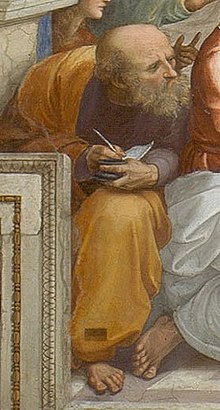Anaximander
pre-Socratic Greek philosopher
Anaximander (/æˌnæksɪˈmændər/; Greek: Ἀναξίμανδρος Anaximandros; c. 610 – c. 546 BC) was a Pre-Socratic Greek philosopher who lived in Miletus,[3] a city of Ionia. He belonged to the Milesian school and learned the teachings of his master Thales. He succeeded him and became the second master of that school where he counted Anaximenes and Pythagoras amongst his pupils.[4]
Anaximander | |
|---|---|
 Raphael representing Anaximander (Roma, Museo Nazionale Romano). Probably Roman copy of an earlier Greek original. This is the only existing image of Anaximander from the ancient world. | |
| Born | c. 611 BC |
| Died | c. 546 BC |
| Era | Pre-Socratic philosophy |
| Region | Western Philosophy |
| School | Ionian Philosophy, Milesian school, Naturalism |
Main interests | Metaphysics, astronomy, geometry, geography |
Notable ideas | The apeiron is the arche Evolutionary view of living things[1][2] Earth floats unsupported Mechanical model of the sky Water of rain from evaporation |
Influences
| |
Influenced | |

Little of his life and work is known today. According to available historical documents, he is the first philosopher known to have written down his studies,[5] although only one fragment of his work remains. Fragmentary testimonies found in documents after his death provide a portrait of the man.
References
change- ↑ DK fragments A 11 and A 30
- ↑ "Anaximander". Encyclopædia Britannica Online.
- ↑ "Anaximander" in Chambers's Encyclopædia. London: George Newnes, 1961, Vol. 1, p. 403.
- ↑ Guthrie W.K.C. 1962. A history of Greek philosophy. Vol 1: the earlier Presocratics and the Pythagoreans. Cambridge.
- ↑ Themistius, Oratio 36, § 317
Other websites
changeWikimedia Commons has media related to Anaximander.
Greek Wikisource has original writing related to this article:
- Quotations related to Anaximander at Wikiquote
- Works related to Anaximander at Wikisource
- Philoctete – Anaximandre: Fragments ((Grk icon)) (in French and English)
- The Internet Encyclopedia of Philosophy – Anaximander Archived 2009-10-15 at the Wayback Machine
- Extensive bibliography by Dirk Couprie
- Eric W. Weisstein, Anaximander of Miletus (610-ca. 546 BC) at ScienceWorld.
- Anaximander entry by John Burnet contains fragments of Anaximander